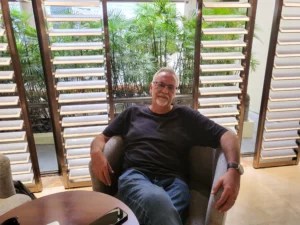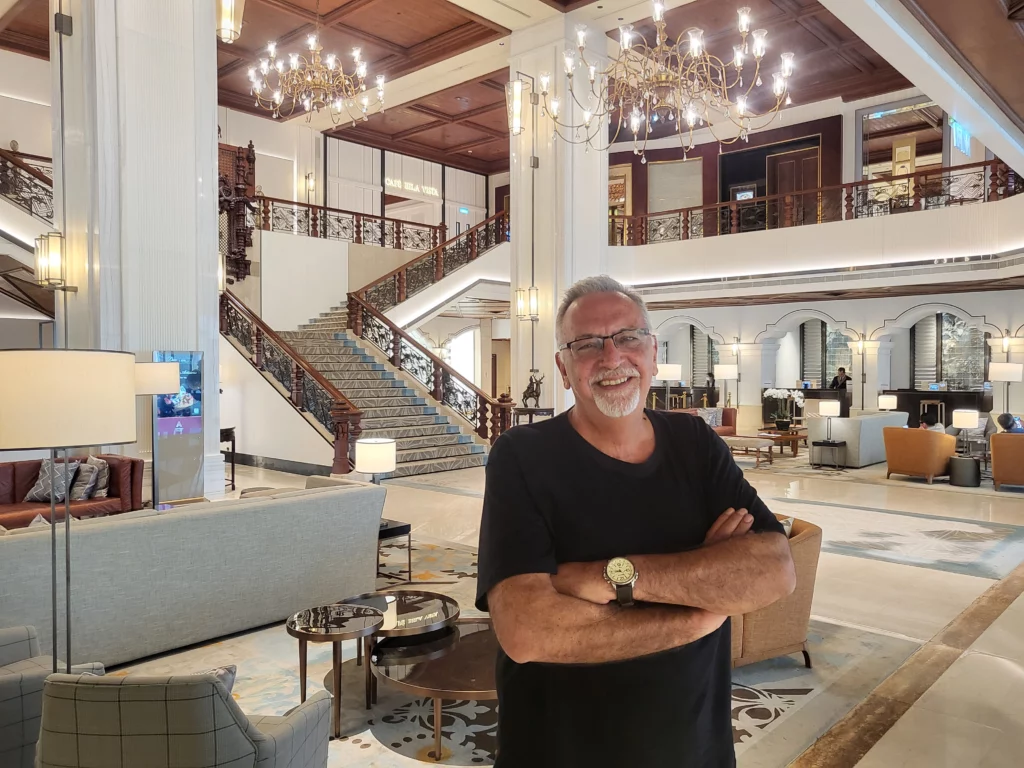– There is today a debate about the preservation of Portuguese identity in Macau, as the city integrates with the rest of China. How important is it to maintain this identity?
Francisco José Viegas – I don’t know; it remains if there is. If, in fact, there is none, it will not be maintained. It is necessary to reinforce it, create bonds. There needed to be more Portuguese people who knew how to speak Cantonese or Mandarin. One thing that surprises me is how few [Portuguese people in Macau] have learned to speak Chinese.
This is kind of weird to me. I mean, we’re only half a dozen steps away, aren’t we? And we didn’t learn to speak. Note that the connections we established from the 16th and 17th centuries were with people who had learned Chinese. They went to Beijing and learned to speak Chinese. They already knew, they learned it in Macau. We are talking about recognizing the patuá in Macau, but we should immediately recognize it in Portugal.
It should be recognized, there should be a knowledge of this.
– Does Portugal really continue to give little importance to Macau? Is the city too forgotten for Portugal?
F.J.V. – In the history of Portuguese overseas territories, Macau was a special case. It was never a colony and the post-25 April process was completely different. Many people didn’t understand and didn’t even have an idea of what Macau was. It was a different process; and today the knowledge of things is very televised and immediate, or very contemporary. Today, for the Portuguese Macau is a casino. Or is it something that is here in front of Hong Kong. I think 90 percent of people [in Portugal] have no idea where Macau is. Which is a shame and greatly contributes to a certain ignorance, to a certain invisibility of Macau; and even some prejudice that may exist in Portugal towards Asian communities.
We have a 500-year relationship, but we don’t know China. It is too far away and there is a prejudice, in fact, that is clear. When we talk about the visibility of migrant communities in Portugal, we are obviously talking about Africa, but we are not talking about, for example, Eastern communities, in quotation marks.

– Should this knowledge effort also come from above, from the Portuguese Government?
F.J.V. – Portugal has an obligation to give more visibility to foreign communities that come to Portugal, to this diversity. There should be more Africans and Asians on television. Why are there still no Asian television presenters? This was necessary to give this visibility and to break down some prejudice. Sometimes we say it’s prejudice, but it’s a lack of habit.
– In recent years we have seen the explosion of global tensions: In Ukraine, in Israel… We see an increase in tension between superpowers. How do you see this phenomenon also between Portugal, the European Union itself and China?
F.J.V. – We cannot talk about a multipolar world without there being poles. When we talk about a multipolar world, but do not recognize the existence of different poles and interests, we are falling into a kind of contradiction. It would be great if we understood this principle: Europeans are not alone, Americans are not alone, Chinese are not alone. For there to be a multipolar world it is necessary to recognize the existence of various interests; and there needs to be, in fact, communication between these poles of interest. But you also need to be careful not to lose your footing. This is evident. It is a very different world to that of 30 years ago, when the last generation of geopolitical thinkers was formed. Everything has changed: the role of Russia, the role of America… The United States changes frequently, and Europe continues to try to find a way. I remember that, ten, 20 years ago, people who said “be careful, the center of the world is moving from the Atlantic to Asia-Pacific” were looked at with great suspicion. But this will also force Europe to understand its role in this order of values. Portugal has also fluctuated a lot; It’s either very Eurocentric, or it’s very Atlantic.
It is also true that we are fragile animals in the midst of all this. It is natural that we have to align according to our interests. It was necessary to see what our interests are in Africa, what they are in Asia, what they are in Europe. There are three very important orders of values for us. And we have a historic role.
– He recently said he wanted to include Macau in future works. What elements here interest you most about putting it into a book?
F.J.V. – It’s an old temptation to write a story in Macau. Why? I don’t know. I mean, the feeling I have is that everything changes quickly here. Since I first came, until today, a lot has changed. And from the last time I came (2016) to today, it has changed even more. So there is a feeling that there is something that is going to be lost and that a person has to pick it up as it floats around. It can’t be seen. I remember the first time I came, the stories I heard… what fascinates me a lot, especially when I’m abroad, are the Portuguese who are outside of Portugal. The stories, their intersections of stories… the family stories are fantastic. Just yesterday I was with someone who, when talking about his family, told me about eight different countries; of each person’s lives and traditions. I imagine all those people at the table. Just thinking about the culinary traditions they must have created… I’m very passionate about them.
– Is the Portuguese diaspora something that interests and inspires you?
F.J.V. – When we talk about the Portuguese diaspora it sounds like something very institutional. We think about consulates, immigration, cooperation… I really think about people, so many who are lost. It doesn’t mean they don’t have a destination, but they move from one side to the other; drag this passage with them. We find such people especially in America and Africa. But here, in Macau, there is a spectacular intersection.
If we look at it, since the 16th century there has been a movement, not migratory, but diaspora, which spread the Portuguese. I have a very non-gloomy view on immigration. I come from a poor village, made up of peasants or railway workers, who emigrated in the 1970s and 1980s. It was a tough, difficult immigration, because they went to a place where they didn’t know the language, namely German and French. . They were people who barely spoke Portuguese, poor things.
Today, when there is a lot of talk about the immigration crisis, I realize that there is once again a flight of our people. But they are completely different situations; people speak English.
In the case of Europe there is freedom of people and goods. I don’t think it’s as scary as it was back then. But I remember the biggest thing about the Portuguese who went everywhere, who settled everywhere, with better and worse stories. There are several nostalgias involved here. One of the reasons why I haven’t written yet is because every time I come to Macau I get the feeling of knowing even less. Every time I come I realize that it is even more complex.



